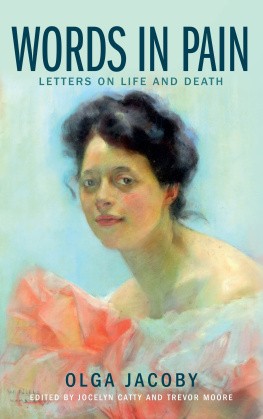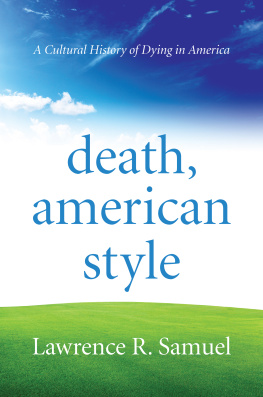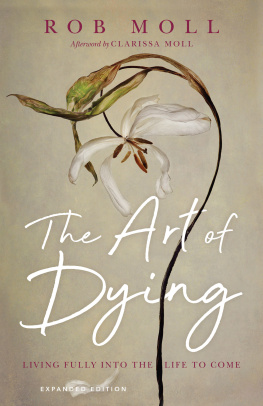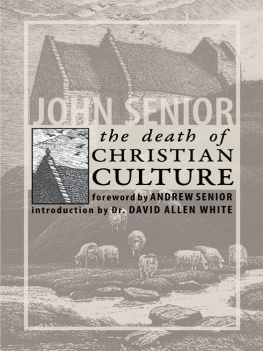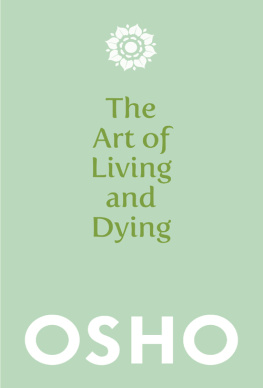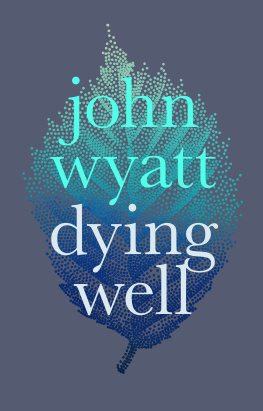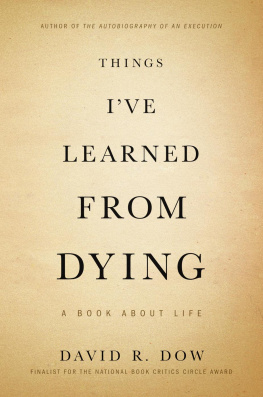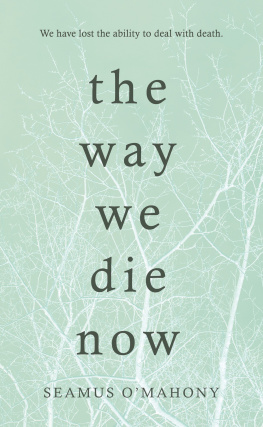
Praise for Words in Pain: Letters on Life and Death
This remarkable book charts the difficult journey of an intelligent and enlightened young woman, as she approaches her inevitable death with optimism, generosity and wit. It is stimulating, moving, profound, and extremely enjoyable.
Mike Leigh
These wonderful letters prove that true immortality lies in what we leave behind. For those of us who cannot accept the consolation of religion, they provide a sane and comforting view of how to live and, more importantly, die. They bear reading and re-reading and teach us how to live even when in the shadow of death. A feminist, rational and heartening voice about the big stufflife and death.
Sandi Toksvig
Words in Pain is an epistolary treasure trove. By turns funny, touching, and intensely sad, Olgas letters muse on timeless questions about the nature of life, love and deathquestions which resonate powerfully today.
Cathy Newman, broadcaster and author of Bloody Brilliant Women
At a time of widespread truth decay, here is a glimpse into the distilled soul of a woman who prized honesty above everything. In the shadow of death, her resonant words make their way to our intellects via our hearts. The freshness, courage and insight of Olga Jacoby help us come to terms with human collage and complexity. This is a marvellous book.
Revd Canon Mark Oakley, Dean of St Johns College, Cambridge
Olga Jacoby was a rare creature who found the ability to rationalise her situation and reflect on it. She is particularly moving in describing her belief in the transformative power of love. I feel privileged to have had access to the innermost thoughts of such a likeable, clever and courageous woman as she confronts her own mortality. Her words feel as relevant today as they must have when written in the early 20 th century. Reading them makes me wish I could have been her friend.
Gill Paul , author of The Lost Daughter
In this remarkable, moving and erudite glimpse of a life lived in the shadow of death, the reader encounters a rare story. With modesty and passion, the letters engage with many of the issues that belonged centrally to this age of transition, especially in relation to debates about science and its relation to religion. Olga was what she calls a Rationalista fearless explorer of her own mind and of those of many others. For this meticulous and deeply personal new edition, all future readers will be extremely grateful.
Margot Waddell , author of Inside Lives: Psychoanalysis and the Growth of the Personality
Words in Pain is the first account of what we would now call assisted dying. The book is a poignant and erudite reminder that human nature does not change, and that this is one arena where our governance over ourselves has got harder and not easier in contemporary times. This is a book to read and read time and again.
Dr Martin Scurr, FRCP, FRCGP
Profoundly moving, profoundly thought-provoking, Words in Pain brings alive Olgas intelligence and humour and above all her vivid awareness of life, death, and what it means to be human.
Emma Darwin , author of This is Not a Book About Charles Darwin
Written in the form of letters that are both intensely personal and clearly turned towards posterity, Words in Pain is a fascinating record of the attitudes towards suffering and death of its period. But the distinctive voice ringing out in this text also feels profoundly contemporary in its frank description of states of despair and rigorous refusal of the consolations of religion. Words in Pain bears compelling witness to the authors commitment to communicating experiences that, both in her period and now, are very frequently left unvoiced.
Professor Laura Salisbury , author of Samuel Beckett: Laughing Matters, Comic Timing
For
Jon Catty
and in memory of Olga Jacoby
and her children Ivan, Kathleen, Robert and Olga
Words in Pain
Published by Skyscraper Publications Limited
20 Crab Tree Close, Bloxham, OX15 4SE
www.skyscraperpublications.com
First published 2019
Afterword copyright 2019 Jocelyn Catty
Foreword and Supplementary Notes
copyright 2019 Trevor Moore
Every effort has been made to trace copyright holders and to obtain their permission for the use of copyright material. The publisher apologizes for any errors or omissions in the above list and would be grateful if notified of any corrections that should be incorporated in future reprints or editions of this book.
All rights reserved; no part of this publication may be reproduced, stored in a retrieval system, or transmitted, in any form or by any means, electronic, mechanical, photocopying, recording or otherwise, without the prior written permission of the publisher. Nor be circulated in any form of binding or cover other than that in which it is published and a similar condition including this condition being imposed on the subsequent purchaser.
A CIP catalogue record for this book is available from the British Library.
ISBN: 978-1-911072-44-7 eBook
ISBN-13: 978-1-911072-35-5 printed edition
Cover concept, design and typesetting by chandlerbookdesign.com
CONTENTS
by Mr Russell
An afterword by her great-granddaughter
By Trevor Moore
FOREWORD TO THE CENTENARY EDITION
SOMETIMES A VOICE FROM the past captures our imagination through the written word. We perhaps think of the diaries of Samuel Pepys or Anne Frank. These have left a powerful legacy that we still appreciate today.
Knowing the identities of the authors adds to the appeal of their works, because we gain a fuller sense of the person, further embellished by available paintings or photographs and an understanding of the social and historical setting of the times in which they lived. How would our appreciation be diminished if we did not know anything about the author?
When I, by chance, came across a faded copy of Words in Pain on a shelf of the Conway Hall Library, its curious title drew me in. I first intended to spend just a few minutes browsing through the collection of letters, written between 1909 and 1913. But they were so packed with profound and moving insights that they had an immediate effect on me and I pored over them for hours. Discovering that the anonymous writer knew her life would shortly come to an end added to their poignancy. Yet not knowing her identity nagged at me.
I hunted down and bought my own copy of this rare book from a specialist bookseller, giving me the freedom to read and re-read the letters at leisureessential, since it is impossible to absorb their full richness from just one reading.
The more familiar I became with their content, the greater the impact the letters had on me. I grew determined to establish the identity of the engaging, often challenging, woman who wrote them. The letters threw up a considerable number of clues, sufficient to allow me to assemble a jigsaw puzzle that provided a picture with which to work, albeit missing a few key pieces.
After time spent at the National Archives in Kew and copious use of many online resources, the eureka! moment came when I tracked down, in the 1911 Census, an entry for a household that matched the family composition and likely locale described in the letters (Hampstead and Golders Green). The writers name was Olga Jacoby. She lived in Crediton Road (later Crediton Hill) in north west London with her husband Jack and her three adopted children (eventually to be joined by a fourth).
Next page
